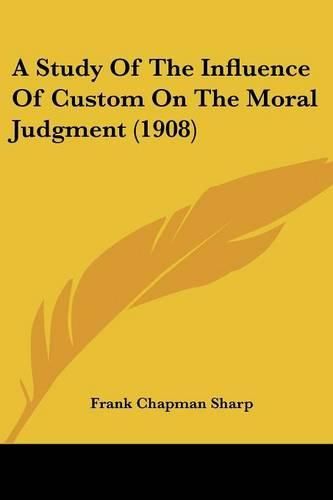Readings Newsletter
Become a Readings Member to make your shopping experience even easier.
Sign in or sign up for free!
You’re not far away from qualifying for FREE standard shipping within Australia
You’ve qualified for FREE standard shipping within Australia
The cart is loading…






Purchase of this book includes free trial access to www.million-books.com where you can read more than a million books for free. This is an OCR edition with typos. Excerpt from book: CHAPTER III AUTHORITY The preceding chapter has attempted to exhibit the morality of the forms of conduct there described as determined by their perceived relation to the welfare of some or all of the persons affected. Even if, however, the validity or the significance of this conclusion from our data be denied, positive evidence was collected during the investigation to show that the account of the sources of the moral judgment put forth by the foreign pressure theory is without adequate foundation. This material the present chapter will pass in review. The theory in question, as has already been pointed out,1 recognizes that the pressure of God’s will is capable of bringing about the same effects as the pressure exercised by society. This is explicitly admitted by Professor Paulsen.2 In any event, it is a necessary implication of the theory. For the former pressure does not differ from the latter in its nature as experienced by the individual who feels it, and where the presence of God is a living reality in the mind the one will be no less than1 the other in intensity. If then the theory is valid, judgments created by this pressure should appear in considerable numbers among those persons who believe that the Bible is an authoritative record of the divine will. To determine how far the facts would meet such a requirement an examination was made of the effects of the dicta of the Bible upon the judgments of those who professed to regard it as the ultimate guide in matters of faith and practice. The material was supplied by the answers to I and V of Series I, and X of Series II. The two former questions will be found above, pages 21 and 22, the last reads as follows: A young man came to New York from the country without 1 See above, page 20. ft’/,/! of EtMct, 3…
$9.00 standard shipping within Australia
FREE standard shipping within Australia for orders over $100.00
Express & International shipping calculated at checkout
Purchase of this book includes free trial access to www.million-books.com where you can read more than a million books for free. This is an OCR edition with typos. Excerpt from book: CHAPTER III AUTHORITY The preceding chapter has attempted to exhibit the morality of the forms of conduct there described as determined by their perceived relation to the welfare of some or all of the persons affected. Even if, however, the validity or the significance of this conclusion from our data be denied, positive evidence was collected during the investigation to show that the account of the sources of the moral judgment put forth by the foreign pressure theory is without adequate foundation. This material the present chapter will pass in review. The theory in question, as has already been pointed out,1 recognizes that the pressure of God’s will is capable of bringing about the same effects as the pressure exercised by society. This is explicitly admitted by Professor Paulsen.2 In any event, it is a necessary implication of the theory. For the former pressure does not differ from the latter in its nature as experienced by the individual who feels it, and where the presence of God is a living reality in the mind the one will be no less than1 the other in intensity. If then the theory is valid, judgments created by this pressure should appear in considerable numbers among those persons who believe that the Bible is an authoritative record of the divine will. To determine how far the facts would meet such a requirement an examination was made of the effects of the dicta of the Bible upon the judgments of those who professed to regard it as the ultimate guide in matters of faith and practice. The material was supplied by the answers to I and V of Series I, and X of Series II. The two former questions will be found above, pages 21 and 22, the last reads as follows: A young man came to New York from the country without 1 See above, page 20. ft’/,/! of EtMct, 3…